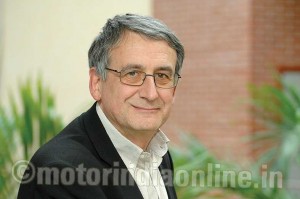In keeping with the general trend among industries to preserve the environment, the Michelin Group keeps initiating newer measures to tackle emissions. Green technology is the group’s motto. In a detailed discussion with MOTORINDIA, Mr. Dominique Aimon, Corporate Communication and Brands, Vice President – Technical & Scientific Communication, Michelin, outlines the group’s overall strategy in green manufacturing and expansion, while answering several vital questions related to green technology.
Excerpts:
What about Michelin’s role in green manufacturing?

When we talk green, it is not just green manufacturing. We need to think more global, more about sustainability. Sustainable development needs to be economical and should take into account the social and environmental aspects. Knows as the ‘Performance and Responsibility Michelin’, our policy insists that to be sustainable we need to be performing. If you do not perform, you will not be sustainable. It has to be done in a more responsive way benefiting the entire community at large.
When we say green, is it only the environmental factor?
Yes. While most of the time we say green it is the environmental factor. However, we must look at other factors also.
Your views on recycling of tyres?
Everything we do has an impact on the environment. The goal is to mitigate this impact. The impact can be sorted out in three ways. First, whatever we do may lead to depletion of natural resources; second, it would have its impact on the human health or bio-diversity; and finally it also induces CO2 emission leading to climatic change. We have to be concerned beyond the manufacturing stage. Production of tyres involves more fuel consumption. Michelin looks at the lifecycle of the product. In each of our plant we have many indicators related to water and energy consumption and emissions caused therefrom.
What about Part Worn Stock (PWS) in tyre management and fully treaded tyres?
A tyre will wear much quicker when it is new. The wear rate of the tyre is not the same even if it is operating in the same temperature on the same road, carrying the same load. In the beginning, its tread pattern is slick and more flexible. The wear rate will be high towards the end. Good maintenance of tyres makes them last longer.
Michelin Tyres have the same property whenever you buy them due to the basic process control developed in our factories. In our Chennai factory, we have air-conditioning to control the temperature at which it operates to make sure that all the tyres we produce are of the same quality whether produced in winter or in summer.
Do the four pillars of Michelin – Reduce, Reuse, Recycle and Renew – affect the company’s turnover?
Michelin invented radial tyres in 1946. With the first radial tyre, its longevity was multiplied by three compared to bias tyres. The company motto is that “If it is good for the customer, it will be good for Michelin.” If we satisfy him he will definitely come back to us. We prefer to reduce the quantity of rubber we put into tyres and increasing the longevity of the product even if the market size is reduced.
Do you have a recycling facility in your factory?
No. Our technologies, the Trec Regenerate and the Trec Alcohol, are for the future and are not for today. It’s an advanced research program which will undergo demonstration to test the technology involved. By 2020, if we are satisfied with all the results we will switch over to our new technology.
What will be the next step forward for the company?
The next step will be to extract more value from the tyre by providing more service. We had recently acquired Sascar, a leading Brazilian digital fleet management and freight security company. There is tremendous amount of technology put into tyres. Instead of just selling tyres, we will sell services, will sell kilometres of mobility. We are investing Euro 400 million on this expansion.